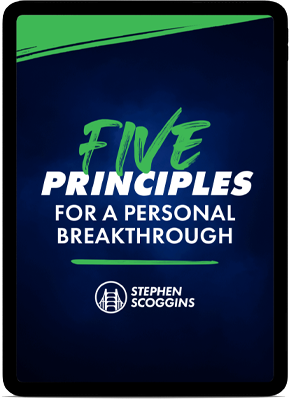
Our beliefs affect everything we do because they control every thought we have. Our broadest-reaching and most intense beliefs are called values.
“Your beliefs become your thoughts, your thoughts become your words, your words become your actions, your actions become your habits, your habits become your values, your values become your destiny.”
― Gandhi
Understanding your own values is crucial in going from stuck to unstoppable. You’ll be able to find the environments where you are most likely to stay motivated and therefore most likely to succeed. You can also better understand your natural gifts, strengths, and weaknesses from what you value. Finally, you can better identify contradictions in your thinking and build a more positive worldview. If you can do this, you can experience total, lasting transformation.
The 7 Value Systems
GW Allport was one of the first psychologists to focus on the study of personality. In fact he is one of the founding fathers of personality study. He believed that values drive most, if not all, of our connections and actions. Allport argued that they control our expectations, limitations, and hunger. Allport argued that people operate from 7 different value systems:
- Aesthetic
- Economic
- Individualistic
- Political
- Altruistic
- Regulatory
- Theoretical
Before we discuss these value systems, it’s important to realize two things. First, everybody has a little bit of each but mostly operates from three. Second, each value system develops from immaturity to maturity as experiences and relationships shape our character over time. Each value system has strengths and blind spots, and each should be considered valid and valuable. In reading this list, try to identify your strongest and weakest value system.
Aesthetic
People with a strong Aesthetic value system prefer form, beauty, and harmony over function. They are genuine and warm personalities with a keen eye for color, design, and emotional appeal. Aesthetics are always seeking balance in themselves and their environment, which leads them to be agreeable and thoughtful.
This value system can make someone particularly distressed in restricted, toxic, or chaotic environments. Aesthetics would rather work in an office with nice decor than in a cubicle for a higher salary. In other words, they’re the most likely to pay extra for comfort and brand identity.
Aesthetics are usually very artistic. They likely need at least one creative outlet in order to be at their best and express themselves fully. Aesthetics also tend to be highly empathetic and sensitive. They can use this to their advantage in a career because they are generally pleasant to be around, but they also likely struggle with assertiveness. Mature Aesthetics are able to fully express themselves without feeling self conscious and are willing to stand up for themselves. They would rather deal with uncomfortable situations than settle for the illusion of peace and become resentful.
Economic
The Economic Value System makes a person pragmatic and objective. Economists see life through the lens of ROI and strive for a practical result in everything they do. They demand high levels of productivity from themselves and others and enjoy competition. When there’s no one to compete with, they will compete with themselves to keep things interesting.
The Economic value system views life in terms of give-and-take. Economists tend to see relationships as a transaction. Even a kiss or a kind word has an expectation of something in return. Economists tend to be excellent in sales and finance because they’re cash conscious and comfortable haggling. They also have an intuitive grasp of the rules of the playing field and the overall strengths and weaknesses of their competition. However, they often struggle with emotional intelligence and intimacy in relationships. This is because their assertiveness and black-and-white view of the world can make them difficult to have healthy conflict with.
At their best, Economists are highly efficient, trustworthy, and responsible. A mature person with high economic values will be very persuasive because they will be able to see through the eyes of the person across from them and understand what they want. They will also understand that value is subjective, and will therefore be more open to other perspectives on what’s fair and true.
Individualistic
Individualists strive to be unique, independent, special, and autonomous in the way they approach the world. You’ll know these people when you see them, because image is one of their primary drivers. They’re energetic and good at standing out. At a party, these people are often front and center, enjoying others’ attention.
The Individualistic value system can be mistaken for the Aesthetic because both types of people tend to be well dressed and creative. In fact, Individualists often hold strong Aesthetic values. The main difference between these systems is that the former is motivated by comfort, while the latter is driven by self actualization. People with strong Individualistic values have a deep sense of destiny. They believe they have something special to give to the world. As a result it’s the most important to them that they have a job that allows them to grow or lets them do something they are passionate about.
Individualistic values make a person charismatic, charming, and interesting. They’re usually more introverted than they appear, spending significant time in introspection exploring themselves. This practice leads to a unique understanding of the human soul and spirit. However, strong Individualistic values tend to make a person self-absorbed, becoming so focused on their gifts and calling that they don’t consider others as important as they are. When a person with individualistic values is mature, their determination to reach their potential expands outward to those around them. They care about others’ destinies as much as their own and see what makes each person special and unique. This makes them great coaches and counselors.
Political
A person with Political values will have a strong desire to be in charge. Recognition, responsibility, and legacy motivate them. They’re very ambitious and are not afraid to use power and control as a tool to hold others accountable.
The Political value system in an immature person will usually make them very bad leaders. They’ll enforce their views and desires on their people without considering how their actions affect them. They will also be highly critical of others while avoiding accountability for themselves, operating by double standards. Perhaps worst of all, this type is the most likely to be dishonest in order to get what they want.
In contrast, mature Politicians can make outstanding leaders. These people understand that their mission matters because it’s for other people. This makes them open, empathetic, compassionate and more likely to work with others than stomp on them. Their desire to do something that matters combined with their natural self confidence can lead to extraordinary achievements that benefit everyone. Above all, the truest mark of a mature political leader is self honesty and the willingness to be held accountable to others.
Altruistic
The Altruistic Value System makes a person idealistic, empathetic, and compassionate. Altruists are usually the people everyone goes to with their problems. They are great listeners and servants with a strong desire to help others. More than any other type, they want people to be healthy and well-taken care of.
Immature Altruists can have a savior complex and a need to be needed. Usually people with this value system struggle with taking on more of other people’s burdens than they should. Altruists are also the most likely to be taken advantage of by toxic people and fall into a codependent relationship. Maturity with the Altruistic Value System involves having healthy boundaries with others and compassion towards oneself. It also involves serving others out of love rather than out of a need to feel valuable and important.
Regulatory
Regulatory people feel that life should be consistent and orderly. They seek an environment that’s organized and regulated.
People driven by Regulatory values will prioritize systems and processes. They’re the people who tend to have everything in a specific place and who couldn’t imagine not making their bed every morning. These people love an environment that is predictable or that allows them to establish structure.
When in immaturity, Regulatory people will prioritize organization over advancement. They will demand a system because it makes them comfortable, even if it doesn’t produce good results. They are also rigid and resistant to change, operating from OCD when in stress. In contrast, mature Regulators know the difference between structure for its own sake and structure that’s effective. They’re flexible enough to make changes to their system when it’s not producing the results it’s supposed to. Furthermore, they’re willing to endure some chaos for the sake of growth and the collective good.
Theoretical
These people love learning. They crave understanding and never seem to run out of questions. They are usually introverted and prefer to spend most of their time contemplating. Like the Individualistic Value System, Theoretical Values usually prize growth and development. However, people driven by Theoretical Values are more motivated by discovery for its own sake. The Theoretical Value system is common among inventors and philosophers (Albert Einstein, Carl Jung, etc.).
People with a strong Theoretical Value System can struggle with passivity. They rarely feel like they have enough information to get started with any given task. New possibilities sometimes distract them, and the weight of the unknown can overwhelm them. Maturity in this value set looks like productivity and confidence. These usually come with the acceptance that trial-and-error is part of the process of both learning and success.
Understanding Your Values Makes You Effective
Once you understand what really drives your behavior, you can take far greater control of your life. Discovering your personal value system can do wonders for your effectiveness, communication and leadership.
Would you like to know your Value Systems and what that means for your growth and advancement? We at the Journey Principles Institute have created a unique personality test designed to equip you for personal transformation. Take it and gain valuable insight into how you work so that you can be your best self and advance towards a more powerful life.



